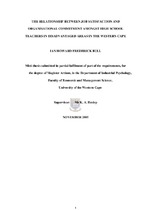The relationship between job satisfaction and organisational commitment amongst high school teachers in disadvantaged areas in the Western Cape
Abstract
Job satisfaction and organisational commitment have been found to both be inversely related to such withdrawal behaviours as tardiness, absenteeism and turnover (Yousef, 2000). Moreover, they have also been linked to increased productivity and organisational effectiveness (Buitendach & de Witte, 2005). This is furthermore postulated to have an influence on whether employees will have a propensity to remain with the organisation and to perform at higher levels.According to Bishay (1996), the teaching profession ranks high on the success list of a society. In conjunction with this, “teachers' organisational commitment and general job satisfaction” (Howell & Dorfman, 1986, p. 37) have been identified as important to understanding the work behaviour of employees in organisations. Job satisfaction amongst teachers is a multifaceted construct that is critical to teacher retention and has been shown to be a significant determinant of teacher commitment, and in turn, a contributor to school effectiveness. Research, however, reveals wide–ranging differences in what contributes to job satisfaction and group differences according to demographic factors (Shan, 1998).

